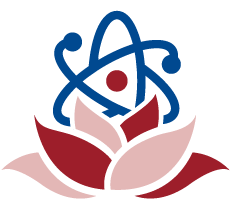| fundamental unit གཞི་རྩའི་བརྩི་གཞི། | phys. One of a set of unrelated units that form the basis of a system of units. For example, the metre, kilogram, and second are fundamental units of the SI system | བརྩི་གཞིའི་མ་ལག་ཅིག་གི་རྩ་བ་གྲུབ་པར་བྱེད་པའི་འབྲེལ་མེད་བརྩི་གཞིའི་སྡེ་ཚན་ཞིག་གི་ནང་གསེས་གང་ཡང་རུང་བ་ཞིག དཔེར་ན། རྒྱལ་སྤྱིའི་ཚད་ལྡན་བརྩི་གཞི་ཡི་གཞི་རྩའི་བརྩི་གཞི་ནི་མི་ཊར་དང་། ཀི་ལོ་གྷ་རམ། སྐར་ཆ་བཅས་ཡིན་ནོ། |
| fundamental particle གཞི་རྡུལ། | phys. A particle, constituting matter, that cannot be broken down into a smaller particle. | བེམ་གཟུགས་ཀྱི་རྩོམ་གཞིར་གྱུར་ཞིང་དེ་ལས་ཕྲ་བའི་ཆ་ཤས་སུ་བགོ་རྒྱུ་མེད་པའི་རྡུལ་ལ་གོ |
| fundamental interactions གཞི་རྩའི་འཐབ་སྦྲེལ། (གཞི་རྩའི་འཐབ་སྦྱོར།) | phys. The four different types of interaction that can occur between bodies. These interactions can take place even when the bodies are not in physical contact and together they account for all the observed forces that occur in the universes. While the unification of these four types of interaction into one model, theory, or set of equations has long been the aim of physicists, this has not yet been achieved, although progress has been made in the unification of the electromagnetic and weak interactions. | དངོས་གཟུགས་ཀྱི་དབར་དུ་འབྱུང་ཐུབ་པའི་འཐབ་སྦྱོར་རིགས་མི་འདྲ་བ་བཞི། འཐབ་སྦྱོར་འདི་དག་དངོས་གཟུགས་ཕན་ཚུན་ཐུག་མེད་ན་ཡང་འབྱུང་ཐུབ་ལ། འདི་དག་གིས་འཇིག་རྟེན་ཁམས་སུ་མངོན་པའི་ཤུགས་ཡོད་ཚད་ལ་འགྲེལ་བཤད་རྒྱག་གི་ཡོད། འཐབ་སྦྱོར་རིགས་བཞི་པོ་འདི་དག་དཔེ་གཞི་ཞིག་གམ། གཏན་ཁྲིམས་གཅིག མཉམ་བྱ་ཁྱུ་གཅིག་ཏུ་སྒྲིལ་རྒྱུ་ནི་དུས་ཡུན་རིང་པོ་ཞིག་གི་ནང་དངོས་ཁམས་ཚན་རིག་པའི་དམིགས་ཡུལ་ཡིན་ན་ཡང་། གློག་ཁབ་ལེན་གྱི་འཐབ་སྦྱོར་དང་ཞན་པའི་འཐབ་སྦྱོར་གཉིས་གཅིག་ཏུ་སྒྲིལ་བར་ཡར་རྒྱས་ཕྱིན་ཡོད་པ་མ་གཏོགས། ད་དུང་ལེགས་འགྲུབ་བྱུང་མེད། |
| fundamental frequency གཞི་རྩའི་ཟློས་ཕྱོད། | phys. The component of lowest frequency in a complex waveform, as in sound. | སྒྲ་ལྟ་བུའི་རྙོག་འཛིང་ཅན་གྱི་རླབས་ཤིག་གི་ཟློས་ཕྱོད་དམའ་ཤོས་ཀྱི་གྲུབ་ཆ་དེ་ལ་གོ |
| fundamental fermions ཧྥར་མི་གཞི་རྡུལ། | phys. | |
| fundamental bosons སྦོ་སོན་གཞི་རྡུལ། | phys. | |
| functioning region བྱེད་ལས་ལྡན་པའི་ཁུལ། ལས་འཇུག་ས་ཁུལ། | neurosci. | |
| functioning cell བྱེད་ནུས་ཕྲ་ཕུང་། | biol. | |
| functional unit བྱེད་ལས་རྩོམ་གཞི། ལས་འཁུར་རྩོམ་གཞི། | | |
| functional tolerance ལས་རུང་ཐེག་ཚད། | neurosci. | |
| functional system ལས་ཞུགས་མ་ལག | | |
| Functional Neuroimaging བྱེད་ལས་དབང་རྩ་པར་ལེན། | Neurosci. | |
| functional neuroanatomy བྱེད་ལས་དང་འབྲེལ་བའི་དབང་རྩའི་ཕུང་གནས་རིག་པ། | neurosci. | |
| functional neuroanatomists བྱེད་ལས་ཀྱི་དབང་རྩའི་ཕུང་གནས་རིག་པ་བ། | neurosci. | |
| functional magnetic resonance imaging (fMRI) བྱེད་ལས་ཁབ་ལེན་མཉམ་འདར་དཔར་ལེན། | phys. Functional magnetic resonance imaging (fMRI) refers to the use of the technology of magnetic resonance imaging (MRI) to detect the localized changes in blood flow and blood oxygenation that occur in the brain in response to neural activity. | བྱེད་ལས་ཁབ་ལེན་མཉམ་འདར་དཔར་ལེན་ནི་ཁབ་ལེན་མཉམ་འདར་དཔར་ལེན་གྱི་འཕྲུལ་རིག་སྤྱད་དེ་དབང་རྩའི་བྱ་བ་ལ་བསྟུན་ཏེ་ཀླད་པའི་ས་གནས་ངེས་ཅན་ནང་གི་ཁྲག་གི་རྒྱུ་བའི་འགྱུར་བ་དང་ཁྲག་ནང་གི་འཚོ་རླུང་ཅི་འདྲ་ཡིན་པ་རྟོགས་པར་བྱེད་པ་ལ་གོ |
